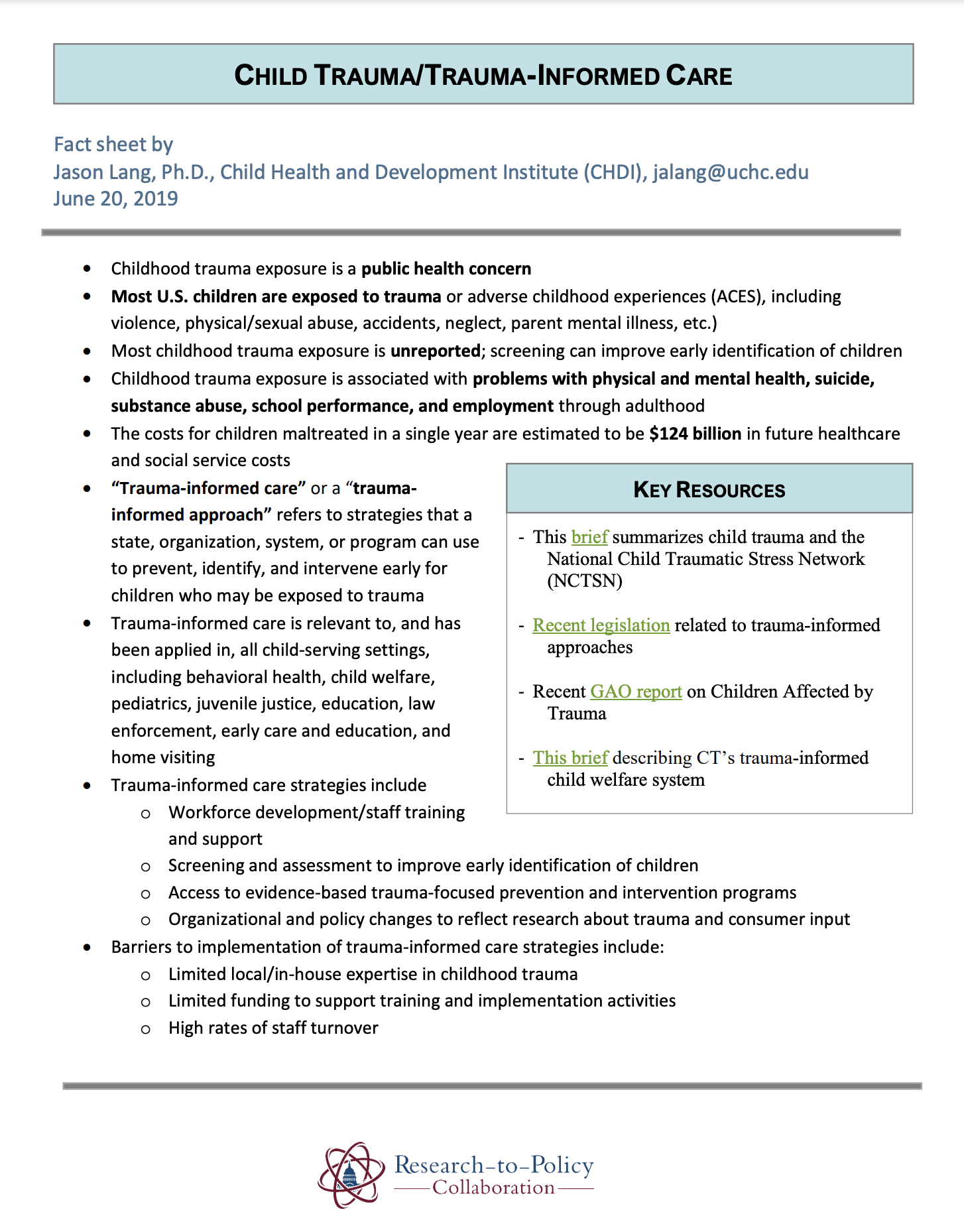
- Childhood trauma exposure is a public health concern
- Most U.S. children are exposed to trauma or adverse childhood experiences (ACES), including violence, physical/sexual abuse, accidents, neglect, parent mental illness, etc.)
- Most childhood trauma exposure is unreported; screening can improve early identification of children
- Childhood trauma exposure is associated with problems with physical and mental health, suicide, substance abuse, school performance, and employment through adulthood
- The costs for children maltreated in a single year are estimated to be $124 billion in future healthcare and social service costs
- “Trauma-informed care” or a “trauma-informed approach” refers to strategies that a state, organization, system, or program can use to prevent, identify, and intervene early for children who may be exposed to trauma
- Trauma-informed care is relevant to, and has been applied in, all child-serving settings, including behavioral health, child welfare, pediatrics, juvenile justice, education, law enforcement, early care and education, and home visiting
- Trauma-informed care strategies include:
- Workforce development/staff training and support
- Screening and assessment to improve early identification of children
- Access to evidence-based trauma-focused prevention and intervention programs
- Organizational and policy changes to reflect research about trauma and consumer input
- Barriers to implementation of trauma-informed care strategies include:Limited local/in-house expertise in childhood trauma
- Limited funding to support training and implementation activities
- High rates of staff turnover
Key Resources
- This brief summarizes child trauma and the National Child Traumatic Stress Network (NCTSN)
- Recent legislation related to trauma-informed approaches
- Recent GAO report on Children Affected by Trauma
- This brief describing CT’s trauma-informed child welfare system
The Research-to-Policy Collaboration (RPC) works to bring together research professionals and public officials to support evidence-based policy. Please visit their website to learn more.
Key Information
RPC Website
Research-to-Policy Collaboration
More RPC Resources
RPC Resources
Publication DateJune 1, 2019
Topic Area(s)Social Services, Health, Violence and Victimization
Resource TypeWritten Briefs
Share This Page
- Childhood trauma exposure is a public health concern
- Most U.S. children are exposed to trauma or adverse childhood experiences (ACES), including violence, physical/sexual abuse, accidents, neglect, parent mental illness, etc.)
- Most childhood trauma exposure is unreported; screening can improve early identification of children
- Childhood trauma exposure is associated with problems with physical and mental health, suicide, substance abuse, school performance, and employment through adulthood
- The costs for children maltreated in a single year are estimated to be $124 billion in future healthcare and social service costs
- “Trauma-informed care” or a “trauma-informed approach” refers to strategies that a state, organization, system, or program can use to prevent, identify, and intervene early for children who may be exposed to trauma
- Trauma-informed care is relevant to, and has been applied in, all child-serving settings, including behavioral health, child welfare, pediatrics, juvenile justice, education, law enforcement, early care and education, and home visiting
- Trauma-informed care strategies include:
- Workforce development/staff training and support
- Screening and assessment to improve early identification of children
- Access to evidence-based trauma-focused prevention and intervention programs
- Organizational and policy changes to reflect research about trauma and consumer input
- Barriers to implementation of trauma-informed care strategies include:Limited local/in-house expertise in childhood trauma
- Limited funding to support training and implementation activities
- High rates of staff turnover
Key Resources
- This brief summarizes child trauma and the National Child Traumatic Stress Network (NCTSN)
- Recent legislation related to trauma-informed approaches
- Recent GAO report on Children Affected by Trauma
- This brief describing CT’s trauma-informed child welfare system
The Research-to-Policy Collaboration (RPC) works to bring together research professionals and public officials to support evidence-based policy. Please visit their website to learn more.

Key Information
RPC Website
Research-to-Policy Collaboration
More RPC Resources
RPC Resources
Publication DateJune 1, 2019
Topic Area(s)Social Services, Health, Violence and Victimization
Resource TypeWritten Briefs
Share This Page
LET’S STAY IN TOUCH
Join the Evidence-to-Impact Mailing List
Keep up to date with the latest resources, events, and news from the EIC.




